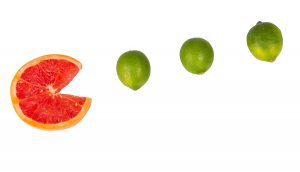 I wish there was one specific fruit or vegetable that knocked out viruses like the PAC-man game. Even better, it turns out there are at least 15 foods that help with virus and flu protection.
I wish there was one specific fruit or vegetable that knocked out viruses like the PAC-man game. Even better, it turns out there are at least 15 foods that help with virus and flu protection.
Like many Americans, Rob and I are self-quarantining because of the corona virus. I still go out for groceries, but I wear gloves and a facial mask. I’m surprised at how few other shoppers are protected by these simple steps.
It occurred to me that some foods are optimal for virus and flu protection. What groceries should seniors include in meals? Here’s a summary of what we should stock up on for a healthy immune boost during the corona virus pandemic, thanks to an informative article on Healthline found here.
10 Foods for Virus and Flu Protection
There’s no vaccination yet against the corona virus, so seniors should do everything they can to improve immune system functioning. First stop should be your grocery store’s produce section.
- Citrus fruits: Vitamin C is thought to increase the production of white blood cells. These are key to fighting infections.Popular citrus fruits include:
- grapefruit
- oranges
- tangerines
- lemons
- limes
- clementines
- Red Bell Peppers: Ounce for ounce, red bell peppers contain twice as much vitamin C as citrus. They’re also a rich source of beta carotene (good for hair and eyes).
- Broccoli: Broccoli is supercharged with vitamins and minerals. Packed with vitamins A, C, and E, as well as many other antioxidants and fiber, broccoli is one of the healthiest vegetables you can put on your table. The key to keeping its power intact is to cook it as little as possible.
More Virus and Flu Immune Boosters
- Garlic, Ginger and Turmeric: These spices give more than a kick to dishes, they are natural immune system boosters. According to the National Center for Complementary and Integrative HealthTrusted Source, garlic may also help lower blood pressure and slow down hardening of the arteries. Ginger is another ingredient with flu and virus protection. It helps decrease inflammation, reduce a sore throat and other inflammatory illnesses. Turmeric is a bright yellow, bitter spice which has been used for years as an anti-inflammatory in treating both osteoarthritis and rheumatoid arthritis. High concentrations of curcumin, which gives turmeric its distinctive color, can help decrease exercise-induced muscle damage.
- Spinach: It’s rich in vitamin C and packed with antioxidants and beta carotene, which increases the infection-fighting ability of our immune systems. Similar to broccoli, spinach is healthiest when it’s cooked as little as possible.
- Yogurt: Look for yogurts that have “live and active cultures” printed on the label, like Greek yogurt. These cultures may stimulate your immune system to help fight diseases. But watch out for yogurt with a lot of added sugar and artificial ingredients. Yogurt can be a great source of vitamin D, so try to select brands fortified with vitamin D. Vitamin D helps regulate the immune system and is thought to boost our body’s natural defenses against diseases.
- Almonds: When it comes to preventing and fighting off colds, vitamin E tends to take a backseat to vitamin C. However, vitamin E is key to a healthy immune system. It’s a fat-soluble vitamin, meaning it requires the presence of fat to be absorbed properly. Nuts, such as almonds, are packed with the vitamin and also have healthy fats.
Green Tea, Seeds and Tropical Fruit
- Green Tea: Both green and black teas are packed with flavonoids, a type of antioxidant. Where green tea really excels is in its levels of epigallocatechin gallate, or EGCG, another powerful antioxidant. EGCG has been shown to enhance immune function. Green tea is also a good source of the amino acid L-theanine. L-theanine may aid in the production of germ-fighting compounds in your T-cells.
- Sunflower Seeds: These seeds are incredibly high in vitamin E, a powerful antioxidant. Vitamin E is important in regulating and maintaining immune system function. Other foods with high amounts of vitamin E include avocados and dark leafy greens.
- Papaya and Kiwi: Papaya is loaded with vitamin C (224 percent of the daily recommended amount of vitamin C in a single papaya). Papayas have a digestive enzyme called papain that has anti-inflammatory effects. Like papayas, kiwis are naturally full of a ton of essential nutrients, including folate, potassium, vitamin K, and vitamin C. Vitamin C boosts white blood cells to fight infection.
Chicken Soup for Virus Protection?
Chicken is the only non-plant based food on Healthline’s list of immune boosting food that offers flu and virus protection.
About 3 ounces of light turkey or chicken meat contains 40 to 50 percent of your daily recommended amount of B-6. Vitamin B-6 is an important player in many of the chemical reactions that happen in the body. It’s vital to the formation of new and healthy red blood cells. Stock or broth made by boiling chicken bones contains gelatin, chondroitin, and other nutrients helpful for gut healing and immunity.
Stay healthy, avoid contact with others for a while, keep busy and happy. This too shall pass. Blessings.

Recent Comments